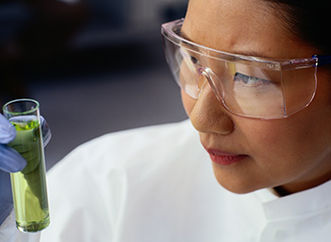- Funding opportunities
- General development
- Political framework
- Funding the cooperation with the partner country
- Priority topics of the cooperation
- Finding Korean partners
Funding opportunities
For up-to-date information please vist our web page 'Current Announcements'.
Please get in touch if you have any questions about the support services provided by the International Bureau.
General development
The economic ascent of South Korea in recent decades went hand in hand with a rapid development of the Korean R&D landscape. Perpetually increasing investments (proportion of gross domestic expenditure for research and development of more than 4%) have turned South Korea into one of the strongest OECD countries in terms of research and ensure that its R&D landscape continues to grow. The attractiveness of Korean research institutions as cooperation partners for German researchers has risen significantly due to their steady further development.
In the past, research and development (R&D) in South Korea was primarily application-oriented and achieved high-level performance in e.g. information and communication technologies. The internationalisation of the Korean R&D landscape plays an important role in Korean innovation policy because this is seen as a necessary condition for inclusion in international top-level research. In addition to expanding existing bilateral cooperation with important strategic partners, this also comprises greater involvement in multilateral institutions and research projects. This includes Korea's association to Horizon Eurpe, the European framework programme for research and innovation, which has been completed in 2025.
Basic research is a comparatively new priority. The research centres of the 'Institute of Basic Science' founded in 2012 have the objective of becoming a working location for leading researchers from all over the world along the lines of the Max-Planck Society and the Japanese research institute RIKEN. As such, they want to make a contribution to the development of South Korea from a 'fast follower' to a 'first mover'.
Industrial research and development in South Korea continues to be influenced primarily by the 'Chaebol', large industrial conglomerates like Samsung and LG. South Korea has viewed the comparatively low number of innovative small to medium-sized enterprises (SMEs), which are important for economic development, as a weakness for several years now, and much action is taken to counteract this. The German innovation system is often mentioned as a paradigm in this respect.
The special role of Germany for the collaboration with European partners is apparent e.g. in the fact that the Korean Institute of Science and Technology (KIST) has been running its own research institution in Germany based on German law with its KIST-Europe branch established in 1996.
Political framework
The bilateral cooperation is based on an inter-governmental agreement between the Government of the Federal Republic of Germany and the Government of the Republic of Korea on scientific and technological cooperation dated 11 April 1986 (BGBI 1986 II 928). Subsequently, several individual agreements were concluded between universities and research and research funding institutions in the two countries.
Since December 2007, the bilateral education and research cooperation has been coordinated at government level by the 'Korean-German Cooperation Committee on Science & Industrial Technology' (KGCCSIT). This committee was formed based on the successful activities of two committees managed by research organisations and its objective is to expand the collaboration further. On the German side, it is managed by the Ministry of Research, Technology and Space (BMFTR) with the involvement of several research organisations and agencies. On the Korean side, responsibility for management alternates between the Ministry of Science and ICT (MSIT) and the Ministry of Trade, Industry and Energy (MOTIE). By now, we can look back on four successful bilateral KGCCSIT meetings.
Funding the cooperation with the partner country
The bilateral R&D cooperation between Germany and South Korea rests on many different shoulders. In addition to the cooperations of German research organisations and individual universities, there are also cooperation projects which are supports by the project funding available in the context of BMFTR funding announcements.
Priority topics of cooperation
The bilateral R&D cooperation covers a very broad range of topics: in recent years, the priorities have been on the life sciences, information and communication technology, nanotechnology, materials research, environmental research, physical and chemical technology and marine and polar research. (projects 2010-2017). The projects from 2018 onwards are focusing on digitalisation, robotics, lightweight construction, energy transition and green hydrogen.
2+2 funding call
To implement the results of the 2015 STC meeting, funding calls for so-called 2+2 projects have been carried out with the Korean Ministry of Science and ICT (MSIT) and the Ministry of Trade, Industry and Energy (MOTIE) since 2016. The research projects between German and Korean universities, research institutions and companies deal with robotics, semiconductors, digitalisation in red biotechnology and AI in biodiversity research, lightweight construction and energy transition.
APRA research presences
Since 2009, so-called research presences in the Asia-Pacific Research Area (APRA) have been funded by the German ferderal research ministry. Two research presences on the topic of green hydrogen started in summer 2021 and have a running time of 5 years and are funding budget up to 760,000 euro.
EUREKA and Eurostars
South Korea became an associated country to the EU EUREKA programme in June 2009. It has had the status of a 'EUREKA Partner Country' since July 2018. The country is involved in a growing number of EUREKA projects and in several cases also leads the project consortium.
South Korea is also a member of EUROSTARS. Since 2014, the 1+1 rule has applied in the EUROSTARS 2 programme. For South Korea, this means that it can participate in a bilateral consortium as long as the other partner is from a EUROSTARS member country. In addition, South Korea can take over the project leadership.
Finding cooperation partners in Korea
Universities, research institutions and companies interested in research cooperation with Korea are offered a matchmaking platform by the project.








